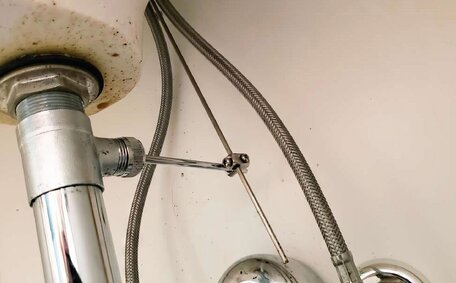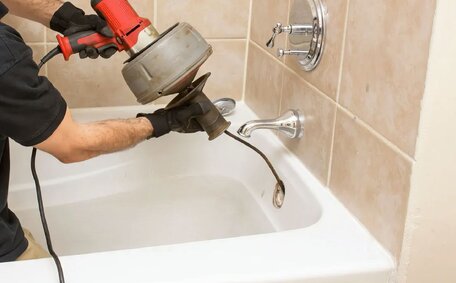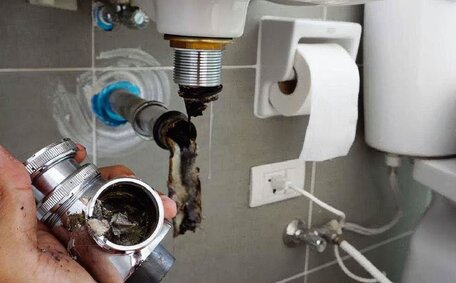Recognizing the Smell of a Gas Leak
A potent sulfur or rotten egg smell typically indicates a gas leak, thanks to odorants like mercaptan infused in natural gas.
Detecting this odor near your gas lines implies a likely leak, necessitating urgent measures. Here are the steps to take:
- Avoid activating any lights or appliances, as well as any actions that could ignite a spark.
- Evacuate immediately, keep everyone at a safe distance from the affected area, and call a gas line repair service for assistance.
- Call 000 from outside or a neighbour’s house - never assume it’s a false alarm.
- Do not re-enter the property until emergency services have inspected for leaks and given the all clear.
Only licensed gas fitters have the requisite skills for precise detection and repair of gas leaks.
Do not ignore potential gas leak signs - trust your senses, evacuate immediately, and seek professional help.
Hissing Noises Coming from Gas Appliances
Hissing or whistling noises from gas appliances often signal that natural gas is escaping due to a leak, which can be dangerous. Such sounds generally arise when a pressurised gas line cracks, forming openings that allow gas to escape. In addition to other signs like banging or fluttering noises, these can also suggest the presence of gas leaks.
Should you detect these noises near appliances like a water heater, stove, or oven, do not attempt to investigate on your own. The first step is to safely shut off your gas at the mains or meter.
Promptly shutting off the gas supply helps prevent the leak from worsening before inspection. Evacuate these regions and promptly call professional gas safety experts to manage the gas in your vicinity.
Experts use specialised equipment to pinpoint the exact locations where your gas line may be compromised. They may use solutions like soapy water and electronic sensors. Based on their scrutiny, they’ll decide if you must replace your gas line or if repair alone suffices.
Be alert for warning signs such as hissing sounds or unusual noises from your gas pipes or appliances, which may impact your utility bills. In certain situations, it’s prudent to switch off all gas controls, vacate the premises and contact a specialist without delay. Rectifying leaks quickly is crucial for preventing explosions, fires, poisoning, and costly repairs down the track.
Visible Signs of Rust or Damage on Gas Pipes
Visible signs of rust corrosion or damaged gas pipes can indicate a gas line blockage or where a leak might be potentially hazardous. If you notice flaking metal or bubbling paint during a gas line inspection, this could point toward internal corrosion and the need for repairs.
Any indication of rust or damage should be considered an urgent call to action, warranting immediate inspection and repair from professionals. Don’t attempt DIY repairs; instead, call gas line repair professionals. For plumbing gas line safety, immediately switch off the gas and contact professional licensed gas fitters to conduct thorough inspections.
Armed with detection tools, call your local experts who will uncover the origins of leaks and advise on essential repairs or if a complete pipeline replacement is necessary.
Shut off the gas immediately and call professionals to prevent escalation.
Always prioritize safety if signs suggest a need for gas line repair. Remember, Even seemingly minor external damage can conceal dangerous internal deterioration of your gas system.
Plants Near Gas Lines Appearing Dead or Dying
Wilting or dying plants near your natural gas line might imply a potential gas leak. Gas exposure can be toxic to flora whether the lines run above ground outdoors or underground near foundation plantings.
Gas leaks can displace oxygen, causing healthy plants to wilt, discolor, or brown.
These signs of potential home gas line problems warrant immediate gas line inspection and tend to show up suddenly if gas exposure is the cause.
Do not overlook withering plants in your yard; they signal a need for a comprehensive gas line inspection by experts. Take action by:
- Turning off the gas main valve immediately
- Ventilating the area to allow fresh air circulation
- Engaging a licenced gas professional to inspect all gas pipes and connections for leaks
- Replacing damaged sections
Disregarded gas leaks can actually elevate risks, including explosions and hazardous poisoning incidences. Rule out a potential gas problem before assuming other causes.
Therefore, if your wilting garden suggests signs your gas line is at fault, it could mean it’s time for immediate action. Your vegetation’s health could help reveal issues.
Fog or Condensation Near Gas Appliances
Dense fog or unusual condensation near gas appliances like your water heater can be a sign of a dangerous gas leak. Hiring professionals who can locate the source of this moisture, often due to corrosion allowing gas and water vapour to mix, is crucial.
If you encounter foggy air or pooled water around appliances, such as water heaters or ovens, it’s important to contact gas safety experts immediately. Take safety precautions immediately by:
- Turning off the main gas valve to stop the leak worsening
- Ventilating rooms with open windows/doors
- Evacuating everyone until emergency crews arrive
- Calling qualified gas fitters to find and repair the leak source
Ignoring signs of leaks can increase the risk of fires, explosions, and exposure to toxic gases. Moisture near appliances clearly signals potential deterioration allowing gas escape. So respond swiftly by shutting off supply and getting expert help the moment fog or condensation is observed.
Decreased Gas Pressure or Appliance Performance
If your gas appliances like stoves, ovens or hot water systems seem to be performing poorly, this may indicate an issue with decreased gas pressure reaching your home.
Warning signs inside your appliances include:
- Flames that burn smaller or cooler than normal
- Longer heating times for appliances
- Hot water running out faster than usual
Low pressure prevents adequate gas from reaching your appliances. This issue may worsen as the integrity of your home’s gas lines succumbs to corrosion over the years. Don’t ignore decreased performance - it likely means gas isn’t reaching fittings properly.
Turn off your main gas valve for safety and call a licenced gas fitter to inspect the issue. Employing manometers to assess pressure, they can identify disruptions and ascertain if the line needs repair or thorough cleansing, or outright replacement if it has decayed.
With professional support, you can guarantee the line your home relies on is fully functional and efficiently delivering gas for optimal appliance performance. Don’t put up with poor performance - decreased pressure indicates underlying problems needing prompt attention before bigger issues arise.
Unexplained Health Issues in the Home
If you or other occupants in your home suffer from seemingly unexplained health issues like headaches, nausea, dizziness or fatigue, this could indicate dangerous gas exposure from a leak.
Take heed of persistent symptoms that alleviate when not inside your home and check your gas systems for leaks. Conduct gas safety checks like:
- Smelling for rotten egg odours
- Inspecting appliances for abnormal operation
- Checking vegetation health outside
- Watching for condensation or fog inside
If numerous occupants share these issues your home is facing and there’s no other explanation, address the problem your gas main may have by turning it off and calling qualified plumbers to search for potential leaks. We can employ electronic sensors or leak detection solutions to locate any breaches in pipes and recommend repair strategies.
Disregarding these symptoms can jeopardize your health, heightening the risks of gas poisoning, explosions, and severe health consequences. Your wellbeing shows problems exist. So take action fast when suspicious symptoms arise - we’re ready to help investigate.
Higher Than Normal Gas Bills
A sudden and unexplained increase in your gas bills could point to a leak in your gas line. If the increases coincide with cold weather, higher usage may be the cause - but rule out a potential leak first, especially if you can’t find any other reason.
Start by comparing bills month-to-month to determine when spikes began occurring.
We recommend calling in the experts when your home gas lines require a professional examination for leaks. With bespoke leak detection equipment and know-how, they can identify issues pertaining to why you might need gas line inspection. They’ll also check line pressure and appliance performance for other deficiencies restricting proper gas flow.
Based on inspection, qualified technicians equipped to detect gas leaks will advise if repairs, replacement or upgrades are required to stop wastage contributing to elevated bills. Identifying leaks promptly not only keeps your energy bills from rising sharply but also lessens the risk and prevents exacerbating the damage over time.
Don’t ignore rising gas bills – get professional assistance to either confirm higher seasonal need, or identify and rectify leaks boosting your usage unnecessarily. Your costs and safety depend on properly maintaining gas line integrity.
The Dangers of Gas Leaks and Proper Safety Steps
Gas leaks are severe hazards requiring immediate action. The main risks involved with gas leaks are:
- Fire – A leak in your gas line, if ignited by a spark or open flame, can lead to an explosion or fire, creating serious dangers to both life and property.
- Carbon Monoxide Poisoning - Improper burning of gas due to a leak generates toxic carbon monoxide. Prolonged exposure, even to low levels, can be fatal.
- Asphyxiation - Large volume leaks displace oxygen needed for breathing, especially in confined spaces.
Should your system present a gas problem, it’s imperative to turn gas controls off immediately as overlooking it can lead to grave outcomes:
- Ensure all individuals come out of the building and dial 000 once they’re safely outside.
- To avoid the risk of ignition from escaping gas, refrain from actions such as flipping switches or using electrical devices.
- Shut off the main gas supply valve on your property, if safely accessible.
- Wait for emergency crews to secure hazards and ventilate before re-entering.
- Hire qualified line repair service professionals who can locate the source of leaks and repair all pipes and appliances.
Quickly addressing the integrity of gas lines your household depends on can curtail the volume of gas escaping, thereby averting potential catastrophes. For your safety, if you detect those rotten egg smells in your home, do not hesitate to call; we are on standby to assess any gas line your home might have swiftly.
When to Call a Professional for Inspection and Repair
Calling a professional licensed gas fitter for inspection and repairs is mandatory in various situations, including:
- You smell gas or rotten eggs
- You notice hissing noises emanating from the gas line area of appliances or pipes
- You see visible signs of damage, rust or leaks
- Nearby plants appear sick or dying
- Unusual fog/condensation forms near appliances
- Appliances have decreased performance
- Occupants suffer unexplained health issues
- Your gas bills spike unexpectedly
For any gas line issues, contact our trusted plumbing company, Sans Souci Plumbing, on 1300 349 338 or email [email protected]. Our licenced technicians have the expertise, detection tools and solutions to pinpoint leaks and advise on necessary repairs for your safety.
Gas issues left unaddressed lead to catastrophic risks like fires, explosions and poisoning. Upon noticing any warning signs, contact us immediately to arrange an inspection. We’re available 24/7 to quickly solve problems and restore peace of mind.
Tips to Prevent Gas Line Damage
There are several preventative steps you can take to avoid gas line damage:
- Have your gas lines inspected annually by a licenced professional to check for leaks, corrosion, blockages or other issues.
- When landscaping or digging around your premises, remain aware of the gas line locations to evade disturbances. Accidentally striking a line can be extremely hazardous.
- Ensure that large plants, shrubs, and trees are kept away from underground gas lines to avoid one of the most common causes of damage: root interference.
- Ensure heavy vehicles do not drive or park over sections where buried gas lines run.
- When renovating, protect visible gas lines from contact with materials or debris that could cause punctures or wear.
- Repair any minor pipe damage noticed promptly before it worsens.
Staying ahead can diminish the odds of experiencing leaks in the lines your gas flows through, as well as mitigating blockage risks and other hazardous events. So take preventative steps and regularly inspect your gas infrastructure to safeguard it long-term.






